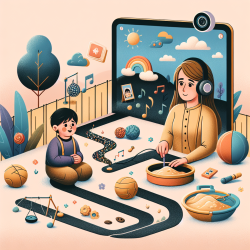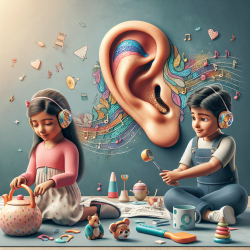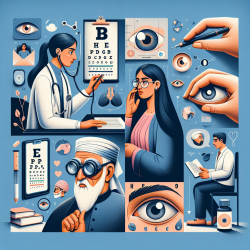Introduction
Sensory deprivation (SD) is a condition that can have significant implications for mental health, particularly in children. The research article "Sensory Deprivation and Psychiatric Disorders: Association, Assessment and Management Strategies" provides a comprehensive overview of the association between sensory deprivation and psychiatric disorders. As practitioners, understanding these associations is crucial for developing effective management strategies and improving outcomes for children.
The Impact of Sensory Deprivation
According to the World Health Organization, millions of individuals worldwide experience sensory impairments, with visual and hearing impairments being the most prevalent. The research highlights that individuals with sensory deprivation are at a higher risk of developing psychiatric disorders such as anxiety, depression, and dementia. This is particularly concerning for children, as early-life sensory deprivation can lead to long-term cognitive and emotional challenges.
Assessment and Management Strategies
Effective assessment and management of psychiatric disorders in individuals with sensory deprivation require a multidisciplinary approach. The research emphasizes the importance of thorough history-taking and awareness of the unique challenges faced during psychiatric evaluations. Modifications in psychometric assessment procedures are necessary to accommodate the specific needs of this population.
- Utilize skilled interpreters for communication during assessments.
- Incorporate nonverbal communication techniques and assistive technologies.
- Consider the use of specialized psychometric tools designed for sensory-impaired individuals.
Implementing Research Findings in Practice
Practitioners can enhance their skills by integrating the findings from this research into their practice. By adopting a holistic management approach, practitioners can better address the complex needs of children with sensory deprivation. This includes:
- Collaborating with specialists such as audiologists, ophthalmologists, and neurologists.
- Implementing pharmacological and non-pharmacological interventions tailored to individual needs.
- Providing psychoeducation and support to families to reduce stigma and enhance understanding.
Conclusion
Understanding the association between sensory deprivation and psychiatric disorders is essential for improving outcomes for children. By leveraging data-driven insights and adopting comprehensive assessment and management strategies, practitioners can make informed decisions that positively impact the lives of children with sensory impairments.
To read the original research paper, please follow this link: Sensory Deprivation and Psychiatric Disorders: Association, Assessment and Management Strategies.










